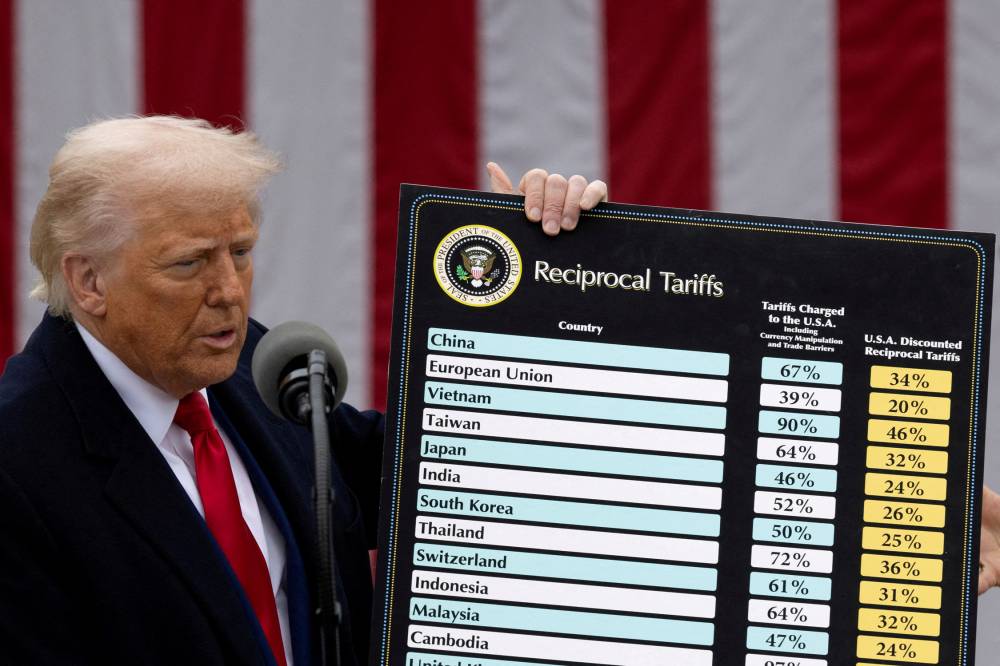Trump tariffs kick in, stoking recession fears

- Investment bank JP Morgan projects a 60-percent chance of a world recession by yearend, following US “reciprocal” tariffs on many countries, including 104-percent duties on Chinese goods.
- Since Trump unveiled his tariffs a week ago, the S&P 500, a stock market index tracking the performance of 500 leading companies listed on US stock exchanges, has suffered its deepest loss since the benchmark’s creation in the 1950s and is now nearing a bear market, defined as 20 percent below its most recent high.
- Trump views tariffs as an all-purpose economic fix that will protect American industries, encourage companies to open factories in America, raise money for the US Treasury and give him leverage to bend other countries to his will, even on issues that have nothing to do with trade, such as drug trafficking and immigration.
WASHINGTON/SINGAPORE—US President Donald Trump’s “reciprocal” tariffs on dozens of countries took effect on Wednesday, including massive 104-percent duties on Chinese goods, deepening his global trade war that has shaken a global trading order that persisted for decades and raised fears of recession.
Investment bank JP Morgan estimates there is a 60-percent chance of the world economy entering recession by year-end.
Since Trump unveiled his tariffs a week ago, the S&P 500, a stock market index tracking the performance of 500 leading companies listed on US stock exchanges, has suffered its deepest loss since the benchmark’s creation in the 1950s and is now nearing a bear market, defined as 20 percent below its most recent high.
European and US stock futures pointed to more pain ahead following a grim session for most of Asia.
The latest round of duties is aimed at countries that are “ripping off” the United States, according to Trump, including many of the United States’ closest allies such as the European Union, which was hit with a 20-percent tariff as well as industry-specific duties.
The 27-member bloc will vote on initial countermeasures later on Wednesday.
China: No to ‘bullying’
Trump nearly doubled duties on Chinese imports, which had been set at 54 percent last week, in response to countertariffs that Beijing announced last week.
On Wednesday, China vowed to take resolute and effective measures to safeguard its rights and interests.
“The US continues to abuse tariffs to pressure China. China firmly opposes this and will never accept this kind of bullying,” Chinese Foreign Ministry spokesperson Lin Jian told a news conference.
Trump has said the tariffs are a response to barriers put on US goods and are needed to fix America’s trade imbalances.
However, some economists have warned that ultimately US consumers are likely to bear the brunt of the trade war, facing higher prices on everything from sneakers to wine.
Nearly three-quarters of Americans expect the prices of everyday items to rise in the next six months, a new Reuters/Ipsos poll found.
The full effects of Wednesday’s tariffs may not be felt for some time, as any goods already in transit as of midnight will be exempt from the new levies as long as they arrive in the United States by May 27.
Economists are puzzled to see Trump trying to overhaul the existing economic order and doing it so soon after inheriting the strongest economy in the world.
“There is a deep irony in Trump claiming unfair treatment of the American economy at a time when it was growing robustly while every other major economy had stalled or was losing growth momentum,” said Eswar Prasad, professor of trade policy at Cornell University. “In an even greater irony, the Trump tariffs are likely to end America’s remarkable run of success and crash the economy, job growth and financial markets.”
Mainstream economists—whose views Trump and his advisers disdain—say the president has a warped idea of world trade, especially a preoccupation with trade deficits—the gap between what it sells and what it buys from foreign countries—which they say do nothing to impede growth.
Long overdue
In Trump’s telling, his tariffs are a long-overdue reckoning: The United States is the victim of an economic mugging by Europe, China, Mexico, Japan and even Canada.
However, the United States is still the second-largest exporter in the world, after China, shipping out $3.1 trillion of goods and services in 2023, far ahead of third-place Germany at $2 trillion.
Trump views tariffs as an all-purpose economic fix that will protect American industries, encourage companies to open factories in America, raise money for the US Treasury and give him leverage to bend other countries to his will, even on issues that have nothing to do with trade, such as drug trafficking and immigration.
However, economists say trade deficits aren’t a sign of national weakness, noting that the US economy has nearly quadrupled in size during that half-century of trade deficits.
Reuters, the news and media division of Thomson Reuters, is the world’s largest multimedia news provider, reaching billions of people worldwide every day. Reuters provides business, financial, national and international news to professionals via desktop terminals, the world's media organizations, industry events and directly to consumers.





















